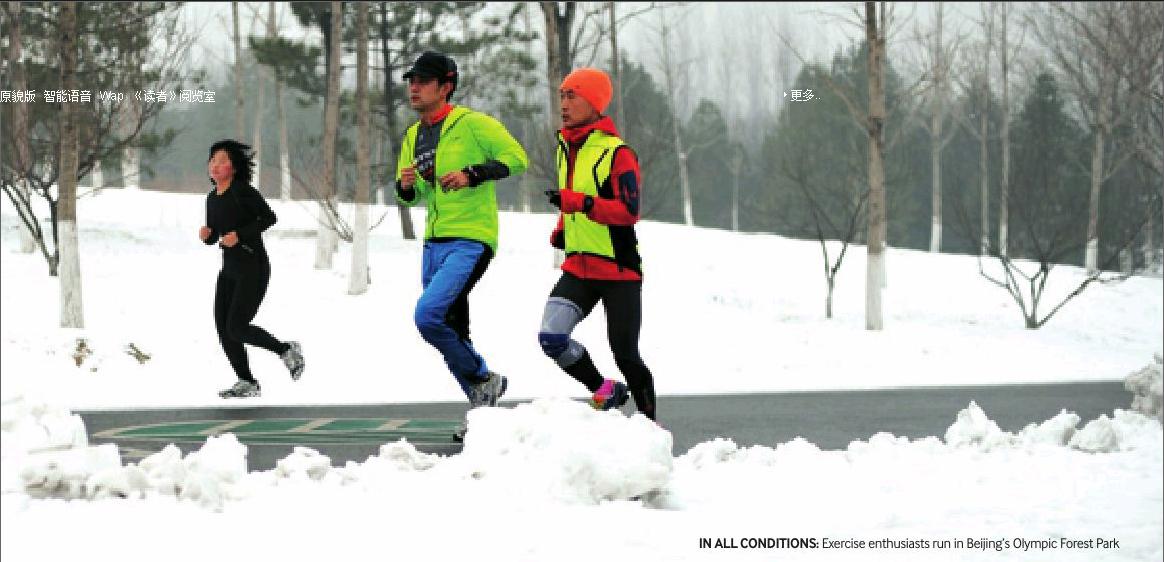Running For Fun
2014-02-25ByYuanYuan
By+Yuan+Yuan

The first thing Chen Xiaohui does every morning is check the weather to make sure it is suitable to go out running.
Chen, General Manager of the Cheers Publishing Co. Ltd., works at the Shangdi Software Park in Beijings Haidian District. He runs through the park every afternoon, sometimes alone but sometimes with coworkers or friends.
Chen remembers the date of his first run—November 29, 2012. On that day, he invited a running trainer, Tian Tongsheng, to deliver a lecture at his company on how much running can change a person.
“At that time, we were publishing a series of books on running, which we think will catch on in China,” Chen said. During the lecture, Tian displayed two pictures of Yu Liang, CEO of China Vanke Co. Ltd., a leading property developer in the country. The pictures showed Yu before and after one year of running. “Yu looked totally different and a lot younger after running,” said Chen, who was impressed enough to follow in Yus footsteps.
When he started running, Chen weighed 86 kg and had some respiratory problems.“The doctors suggested I either got surgery or lose weight,” said Chen, who thought losing weight sounded like an impossible mission at that time. The changes he saw Yu make in just one year gave Chen the confidence to try.
“The Shangdi Software Park is an ideal place for running as it is quiet and spacious,”said Chen, adding that he now sees runners from other companies on his afternoon jogs. Most of the runners have started within the last year, according to Chen.
After one year of running, Chen lost 14 kg and felt much more energetic than before. In September 2013, he ran his first marathon in Yantai, east Chinas Shandong Province. He also participated in the Beijing Marathon last October and plans to go to Tokyo for its annual marathon that is due to take place on February 23.
In 2014, Chen plans to lose another 4 kg. “I am confident I can do it,” Chen said. “The spirit of a marathon is to persist. As long as you dont give up, you will hit the finish line in the end.”
A healthy lifestyle
Yu, the CEO of Vanke, began his running routine in 2012 with making preparations to climb Qomolangma, also known as Mount Everest. Yus attempt was inspired by Vankes Board Chairman Wang Shi, who had already reached the summit of Qomolangma twice—in 2003 and 2010.
Within one year, Yu lost 11 kg and in May 2013 he successfully made it to the top of Qomolangma.endprint
“It was a great surprise for me and I shared my experience with running everywhere I went,” Yu said.
In Vanke, fitness has been listed as one of the criteria for managers promotion, prompting more workers to choose running as their means of exercising.
In 2011, Pan Shiyi, Board Chairman of SOHO China, another property developer in China, started to post his running progress on his microblog that attracted many followers.
“Running in the morning brings a good mood and good health,” Pan said. “Now I have a better appetite and I sleep better. I feel pretty much relieved from the pressures of work.”
Pan runs 10 km every day. He said that the first month is the most difficult for someone starting out. “As long as you dont give up in the first month, you will benefit from the exercise,”he said. “Its best to invite friends to join and to encourage each other to persist.”
In June 2013, Pan took part in a half marathon in Lanzhou, capital of his home province of Gansu in Chinas northwest.
Besides Yu and Pan, Vankes Vice President Mao Daqing and Wei Jianglei, Vice President of Lenovo Group, Chinas largest PC producer, are also known for their enthusiasm for running.
Running has become a fashionable trend among people from all walks of life in China in recent years.
In 2008, the first Chinese website dedicated to running—bbs.runbible.cn—went online. Two years later, another website, bbs.running8. com, was set up and has since become the largest online community for runners in China with more than 150,000 registered members.
“Running has become a new way to make friends,” said 32-year-old Cheng Yang, a registered member of bbs.running8.com who works at an entertainment company in Beijing. Chengs love for running started with a night-time jog in 2009.
“Before that, I thought running was a lonely sport, but that day changed my conception of running,” Cheng said. “After running, we went to drink and chat. I realized that running can be a social activity.”
Cheng has since begun to visit running websites and organize running activities. “No matter where you are, you can easily organize a group of runners,” Cheng said. “We run together and share our experiences with running.”
In 2013, Cheng bought a Nike+, a product made by athletic wear company Nike Inc., which tracks the performance of runners. “Every time I finish a run, I share the details online to compete with my running friends,” Cheng said.“I was kind of an introvert before, but now I am more open due to my experiences of running.”endprint
Twenty-seven-year-old Jiang Zhongwen keeps his running record on a microblog, which has gained more than 4,000 followers. “It is like a short running diary,” Jiang said. “It is also a way to push myself to persist and encourage other people to get involved in the sport.”
Jiangs running habit also started with a night running club. “It was in 2009. I saw some runners wearing sportswear with luminous decorations and thought it was cool,” said Jiang, who joined in soon after and can now run 20 km a night.
In October 2012, Runners World, a globally circulated monthly magazine published by Rodale Press in the United States, launched a Chinese edition. It is Chinas first running-specific magazine.
In the same year, Nike opened a store in Beijings bustling Sanlitun area, selling only running sportswear and gear.
“We knew running would become popular in China, but we never thought it would happen so soon,” said Wang Lei, Communication Director of Nike China. “Now the word ‘runningdoes not make people think of a tedious sport anymore. It has taken on new meanings—fashion, energy and youth.”
Marathon fever
“Once you start running, you will want to run a marathon one day,” said Zhao Quanming, an automation engineer in Beijing.
Zhao started running in the 1990s and has seen the growing popularity of marathons in recent years.
The annual Beijing Marathon, which started in 1981, is the oldest international marathon competition in China. In its first 17 years, however, only professional runners could participate.
“For a long time, a marathon sounded like a dream to us amateur runners in China,” Zhao said.
In 1998, amateurs were allowed to officially register to run the Beijing Marathon. Organizers also added new races, including a mini-marathon (5 km), a half marathon and a 10-km run, to cater to the needs of runners varying in their physical conditions and skills sets.
Zhao ran his first Beijing Marathon in 1999 and since 2002 he has participated every year. “There are more and more runners every year, especially in 2013,” Zhao commented.
According to organizers, more than 30,000 people registered to run the Beijing Marathon last year.
Chu Jingyu, a 21-year-old student at the Beijing-based Renmin University of China, took part in the Beijing Marathon with some classmates in 2013.
“A marathon sounded too long for me before,” said Chu, who failed to complete the race as an unseasoned runner. “We went there just for fun but the joyful atmosphere really impressed me and I decided to practice running and to go again in 2014.”
Now Chu runs on campus every afternoon.“Many of my friends regard running as the most boring sport, but only after you indulge in it can you realize how fun it is,” she said.
The General Administration of Sport of China revealed that across China, 39 officially recognized marathons were held in 2013. Between them, they registered a combined 750,000 runners, up 250,000 from the previous year.
Zhao Fushan, a 66-year-old man from a Beijing suburb, has run six marathons. “Life lies in movement and running is almost the easiest sport to do,” he said. “Why dont we run?”endprint
